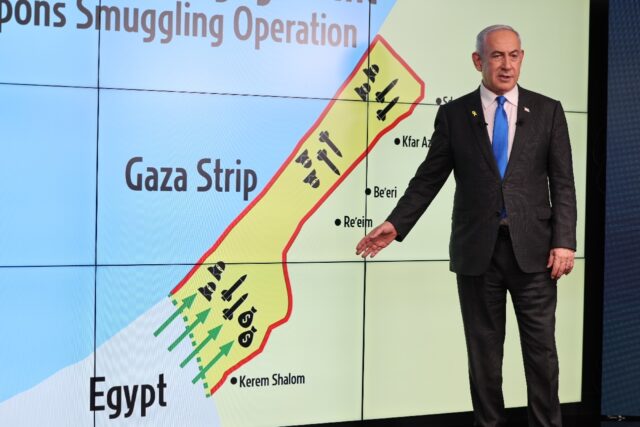Israeli Prime Minister Benjamin Netanyahu said on Wednesday that Hamas had rejected all elements of a proposal for a ceasefire in Gaza that would help facilitate the release of hostages.
“Hamas has rejected everything… I hope that changes because I want those hostages out,” Netanyahu told a news conference, casting doubt on the possibility of a breakthrough one day after the State Department said it was “time to finalise that deal”.
“We’re trying to find some area to begin the negotiations,” Netanyahu said.
“They (Hamas) refuse to do that… (They said) there’s nothing to talk about.”
Netanyahu has come under added domestic and international pressure to seal a deal that would free Israeli hostages after authorities announced on Sunday the deaths of six whose bodies were recovered from a tunnel in southern Gaza.
On Monday, Netanyahu said Israeli forces would retain control over the Philadelphi Corridor along the Egypt-Gaza border, vowing “not to give in to pressure” over the issue.
Hamas, whose unprecedented October 7 attack on southern Israel started the war, is demanding a complete Israeli withdrawal from the area as part of the stalled talks mediated by the United States, Qatar and Egypt.
At Wednesday’s news conference, Netanyahu reiterated his position on the Philadelphi Corridor, saying that ceding control would allow Hamas to smuggle weapons in and hostages and “terrorists” out.
“You need something to squeeze them, to prevent them, to put pressure on them to release the remaining hostages,” he said.
“So if you want to release the hostages, you’ve got to control the Philadelphi Corridor.”
State Department spokesman Matthew Miller told reporters on Wednesday that Washington recognised “the very real needs that Israel has to ensuring that there can’t be smuggling across the Philadelphi Corridor”, but said “we think that there are ways to address” the issue.
Reaching a deal “is going to require flexibility from the government of Israel, just as it’s going to require Hamas to finally find a way to get to yes,” Miller said.
Netanyahu, for his part, said he was “flexible when I can be” and “firm when I have to be”.
‘Whole thing’ unresolved
He also stressed that the debate over the Philadelphi Corridor was not the sole sticking point.
Also unanswered, he said, were questions over how many Palestinian prisoners would be freed in exchange for hostages, whether Israel could veto the release of certain prisoners and where released prisoners should go.
“The whole thing has not been resolved,” he said.
The October 7 attack by Hamas resulted in the deaths of 1,205 people, mostly civilians including some hostages killed in captivity, according to official Israeli figures.
Of 251 hostages seized by Palestinian militants during the attack, 97 remain in Gaza including 33 the Israeli military says are dead. Scores were released during a one-week truce in November — the only one so far.
Israel’s retaliatory military offensive in Gaza has so far killed at least 40,861 people, according to the health ministry in the Hamas-run territory.
Most of the dead are women and children, according to the UN rights office.
At protests in several Israeli cities this week, Netanyahu’s critics have blamed him for hostages’ deaths, saying he has refused to make necessary concessions for striking a ceasefire deal.
US President Joe Biden said this week he did not think Netanyahu was working hard enough to free the hostages.
Also on Wednesday, an Israeli far-right minister stepped up pressure on Netanyahu to end negotiations for a Gaza ceasefire altogether.
“A country whose six hostages are murdered in cold blood does not negotiate with the killers, but ends the talks, stops the transfer of fuel and electricity, and crushes them until they collapse,” National Security Minister Itamar Ben Gvir wrote on the social media platform X.

COMMENTS
Please let us know if you're having issues with commenting.